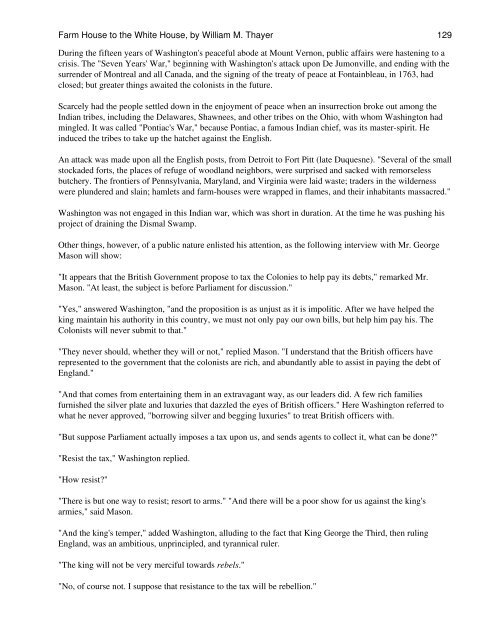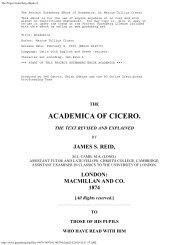From Farm House to the White House - 912 Freedom Library
From Farm House to the White House - 912 Freedom Library
From Farm House to the White House - 912 Freedom Library
You also want an ePaper? Increase the reach of your titles
YUMPU automatically turns print PDFs into web optimized ePapers that Google loves.
<strong>Farm</strong> <strong>House</strong> <strong>to</strong> <strong>the</strong> <strong>White</strong> <strong>House</strong>, by William M. Thayer 129<br />
During <strong>the</strong> fifteen years of Washing<strong>to</strong>n's peaceful abode at Mount Vernon, public affairs were hastening <strong>to</strong> a<br />
crisis. The "Seven Years' War," beginning with Washing<strong>to</strong>n's attack upon De Jumonville, and ending with <strong>the</strong><br />
surrender of Montreal and all Canada, and <strong>the</strong> signing of <strong>the</strong> treaty of peace at Fontainbleau, in 1763, had<br />
closed; but greater things awaited <strong>the</strong> colonists in <strong>the</strong> future.<br />
Scarcely had <strong>the</strong> people settled down in <strong>the</strong> enjoyment of peace when an insurrection broke out among <strong>the</strong><br />
Indian tribes, including <strong>the</strong> Delawares, Shawnees, and o<strong>the</strong>r tribes on <strong>the</strong> Ohio, with whom Washing<strong>to</strong>n had<br />
mingled. It was called "Pontiac's War," because Pontiac, a famous Indian chief, was its master-spirit. He<br />
induced <strong>the</strong> tribes <strong>to</strong> take up <strong>the</strong> hatchet against <strong>the</strong> English.<br />
An attack was made upon all <strong>the</strong> English posts, from Detroit <strong>to</strong> Fort Pitt (late Duquesne). "Several of <strong>the</strong> small<br />
s<strong>to</strong>ckaded forts, <strong>the</strong> places of refuge of woodland neighbors, were surprised and sacked with remorseless<br />
butchery. The frontiers of Pennsylvania, Maryland, and Virginia were laid waste; traders in <strong>the</strong> wilderness<br />
were plundered and slain; hamlets and farm-houses were wrapped in flames, and <strong>the</strong>ir inhabitants massacred."<br />
Washing<strong>to</strong>n was not engaged in this Indian war, which was short in duration. At <strong>the</strong> time he was pushing his<br />
project of draining <strong>the</strong> Dismal Swamp.<br />
O<strong>the</strong>r things, however, of a public nature enlisted his attention, as <strong>the</strong> following interview with Mr. George<br />
Mason will show:<br />
"It appears that <strong>the</strong> British Government propose <strong>to</strong> tax <strong>the</strong> Colonies <strong>to</strong> help pay its debts," remarked Mr.<br />
Mason. "At least, <strong>the</strong> subject is before Parliament for discussion."<br />
"Yes," answered Washing<strong>to</strong>n, "and <strong>the</strong> proposition is as unjust as it is impolitic. After we have helped <strong>the</strong><br />
king maintain his authority in this country, we must not only pay our own bills, but help him pay his. The<br />
Colonists will never submit <strong>to</strong> that."<br />
"They never should, whe<strong>the</strong>r <strong>the</strong>y will or not," replied Mason. "I understand that <strong>the</strong> British officers have<br />
represented <strong>to</strong> <strong>the</strong> government that <strong>the</strong> colonists are rich, and abundantly able <strong>to</strong> assist in paying <strong>the</strong> debt of<br />
England."<br />
"And that comes from entertaining <strong>the</strong>m in an extravagant way, as our leaders did. A few rich families<br />
furnished <strong>the</strong> silver plate and luxuries that dazzled <strong>the</strong> eyes of British officers." Here Washing<strong>to</strong>n referred <strong>to</strong><br />
what he never approved, "borrowing silver and begging luxuries" <strong>to</strong> treat British officers with.<br />
"But suppose Parliament actually imposes a tax upon us, and sends agents <strong>to</strong> collect it, what can be done?"<br />
"Resist <strong>the</strong> tax," Washing<strong>to</strong>n replied.<br />
"How resist?"<br />
"There is but one way <strong>to</strong> resist; resort <strong>to</strong> arms." "And <strong>the</strong>re will be a poor show for us against <strong>the</strong> king's<br />
armies," said Mason.<br />
"And <strong>the</strong> king's temper," added Washing<strong>to</strong>n, alluding <strong>to</strong> <strong>the</strong> fact that King George <strong>the</strong> Third, <strong>the</strong>n ruling<br />
England, was an ambitious, unprincipled, and tyrannical ruler.<br />
"The king will not be very merciful <strong>to</strong>wards rebels."<br />
"No, of course not. I suppose that resistance <strong>to</strong> <strong>the</strong> tax will be rebellion."















